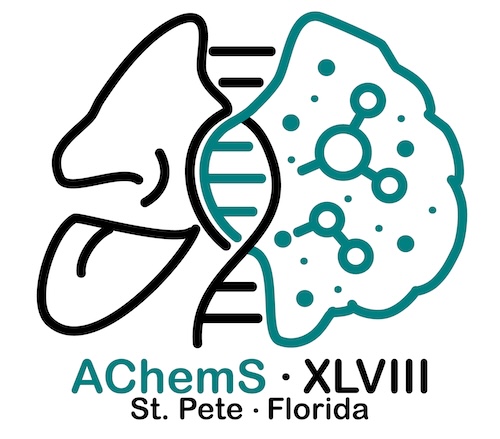AChems Press Release

Association for Chemoreception Sciences (AChemS): Fostering Research and Understanding of the Chemical Senses in Health and Disease & World Smell and Taste Day
Media Contact:
Dr. Martha Bajec, Chair - Public Information & Affairs Committee, [email protected]
TORONTO, November 15, 2021 - Across 5 days in April (19-23) scientists from around the world gathered virtually to present and discuss new information on the role of the chemical senses in disease, nutrition, and social interactions in humans and animals. The 43rd annual AChemS meeting welcomed scientists from around the world to present their latest research findings on myriad topics around chemosensation, ranging from molecular mechanisms through cognitive processes and associated behaviors.
Globally, thousands of people experience loss or dysfunction of the chemical senses (olfaction (smell), gustation (taste), and chemesthesis (touch, temperature, irritation)) each year resulting from head trauma, sinus disease, cancer, and neurological disorders, such as stroke, multiple sclerosis, and Alzheimer's disease, among others. Most recently, loss of smell and/or taste has presented as a troubling symptom of the severe acute respiratory syndrome coronavirus 2 (SARS-CoV-2), which has infected millions globally. By providing a better understanding of the function of chemosensory systems, scientific and biomedical research is leading to improvements in the diagnosis and treatment of many disorders.
Press Abstracts
Selected new discoveries presented at the meeting include:
- AChemS Founder Max Mozell: A Lifetime of Sniffing Out Answers about the Sense of Smell
Contact: Theresa White, +1(315)445-4340, [email protected] - Some people’s saliva made better emulsions with stronger taste
Contact: Li-Chu Huang, +1(765)494-2282, [email protected] - Adult taste neuron structure changes quickly over time, but this remodeling is restricted to the inside of taste buds
Contact: Zachary Whiddon, +1(734)709-7523, [email protected] - Chemosensory Dysfunction in COVID-19: Behavioral and Neurobiological Factors
Contact: Shima T. Moein, +98(912)204-1796, [email protected] - Exciting the Neurons of the Olfactory Bulb Can Prevent Obesity
Contact: Louis Kolling, +1(850)363-8121, [email protected] - Development of flavor perception in kids
Contact: Sarah Colbert, +1(336)452-0239, [email protected] - Modulation of the odor response by irritants
Contact: Federica Genovese,+1(267)519-4847, [email protected] - Interspecific chemosensory communication of emotions: Reciprocal recognition of fear and non-fear body odour between humans and horses
Contact: Agnieszka Sabiniewicz, +48(513)138-302, [email protected] - Cats love some plants
Contact: Masao Miyazaki, +81(19)621-6154, [email protected] - Effects on Growth of Smell and Taste of Milk During Tube Feeding of Preterm Infants
Contact: Friederike Beker, +61(481)54-1286, [email protected] - Identifying odors by name is difficult, but some people are better odor namers than others (and some odors are easier to name)
Contact: Sarah Cormiea, +1(617)302-0009, [email protected]
Additionally, together with clinicians and researchers, members of the AChemS community hosted the inaugural World Taste & Smell Day on September 14th, 2021.
World Taste & Smell Day is a celebration of taste and smell intended to promote awareness, understanding, and appreciation of these essential, yet often neglected, senses. This virtual event also uniquely acted as both a forum for interpersonal support and a clinical resource to the many experiencing taste and/or smell dysfunctions from COVID-19 or other causes.
Highlights from this year’s event and information on next year’s World Smell & Taste Day are available at https://www.tasteandsmell.world/ or by contacting Kareen Kreeger at [email protected].



